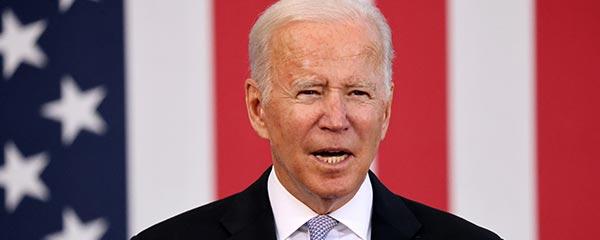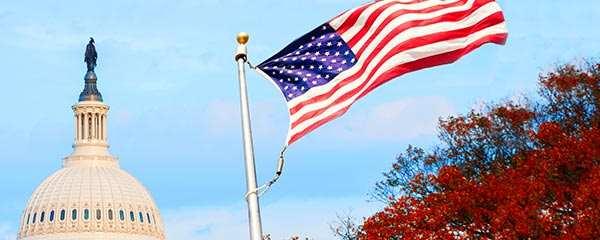Elections for state offices reflect state-specific issues, the personalities and backstories of the candidates running for office, and the dynamics of the campaigns. State elections can also reflect trends and circumstances occurring at the national level. This last point is important, given the tendency of many observers to use the outcomes of Tuesday's elections in Virginia and New Jersey as not only a reflection of the national mood, but also harbingers of the outcome of next year's midterm elections.
Overall Malaise?
The overall dour mood of the country, it has been hypothesized, was a major factor in Virginia and New Jersey voters' support for non-status-quo candidates.
One key indicator is presidential job approval, which serves as a broad indicator of overall public sentiment. ║┌┴¤═°'s Jeff Jones recently updated the latest Joe Biden approval ratings, noting that the president's 45% rating in the third quarter (which ended Oct. 19) is the lowest of any elected president's since World War II except Donald Trump's, although similar to Bill Clinton's 48%. Additionally, Biden's momentum is going in the wrong direction. The 11-percentage-point drop in Biden's approval rating between his first and third quarters is the largest such swing since World War II. (Biden's latest rating of 42% is even lower than his third-quarter average overall.)
Plus, of course, Biden is a Democrat, giving some credence to a presumed connection between his standing and the election performances of the losing Democratic gubernatorial candidate in Virginia (Terry McAuliffe) and the incumbent Democratic governor who barely won reelection in New Jersey (Phil Murphy).
A second measure of the national mood is the question asking Americans about their satisfaction with the way things are going in the United States -- updated by ║┌┴¤═° every month since April 2000 and, on a less regular basis, going all the way back to 1979. Satisfaction is quite low at this point on an absolute basis -- 23% in ║┌┴¤═°'s October update. But this is not atypical. U.S. satisfaction has averaged a lowly 36% across the years since 1979. The last times more Americans were satisfied than dissatisfied were during the dot-com boom in the late 1990s and early 2000s, and then periodically in the years after the 9/11 terrorist attacks. Before that, satisfaction was higher than dissatisfaction only during a few of the Reagan years in the mid-1980s and after the Persian Gulf War in the early 1990s.
More specifically, recent monthly readings have fluctuated, but over the 10 years before 2021 (2011-2020), Americans' average satisfaction level was 26%, two points lower than the overall 2021 average so far and similar to the 23% registered in October.
Why Americans continue to be relatively dissatisfied with the way things are going in their country year after year is fascinating in and of itself, and worthy of in-depth study. For the current purposes, however, the point is that this year's November elections did not take place in an unusually negative national environment, as measured by satisfaction levels. The dour mood of the national electorate, which set the context for state elections, is fairly typical of what we have seen in recent years, going back for more than a decade. Political candidates who campaign as outsiders or as instruments of change to the status quo, including Trump in 2016 as well as those in the recent Virginia and New Jersey elections, are apparently tilling in fertile soil.
Perceptions of the Economy
Exit polls in Virginia showed that facing the state, more than named any of the other four issues tested. Most observers also pegged the economic issue of high taxes as a dominant issue in the New Jersey gubernatorial race.
Nationally, 24% of Americans name some economic issue as the most important problem facing the nation, up somewhat from recent months. Plus, and this is important, ║┌┴¤═° polling shows that overall economic confidence nationwide is at one of its lowest levels in several years, even though other economic indicators are much more positive. As ║┌┴¤═°'s Megan Brenan summarized, "Americans' confidence in the nation's economy remains low and continues to decline, despite low unemployment, record-positive perceptions of the job market, solid economic growth as measured by the gross domestic product, and continued high stock values." In fact, Americans' perceptions that it is a good time to find a quality job are now at their highest level since ║┌┴¤═° began asking the question on a monthly basis 20 years ago.
Why are Americans so negative about the economy even while they perceive the job market to be robust and the stock market has reached record-high levels? We get some clues from a close analysis of the specifics in the answers to ║┌┴¤═°'s "most important problem" question. The 5% of Americans who mention inflation as the top problem facing the nation is the highest since 2008, and the 6% of Americans who mention the deficit is as high as it has been since 2016. These two historical problems are apparently encroaching back into the public's consciousness after many years of dormancy. To be sure, these concerns are not as dominant as they have been in the past. There were times in the 1970s and early 1980s when inflation overwhelmed every other issue in the public's mind; in October 1978, for example, it constituted 83% of all mentions as the top problem facing the nation. And there have been times when more than 20% of the public named the federal deficit as the nation's top problem. But although certainly not back to those levels, the mentions signal that Americans are once again sensing that inflation and deficit spending are concerns of note.
Economic inequality has been a much-discussed issue in recent years, but only 1% of the public mentions the gap between the rich and the poor as the nation's most important problem.
Education, Schools, Local Control
Most observers attribute Republican candidate Glenn Youngkin's success in Virginia at least partly to education issues, a conclusion bolstered by exit polls showing that education was second only to the economy when Virginia voters selected the most important problem facing their state. The specific education issues in play were pushback from mandated school closings during the pandemic and issues relating to school curriculum.
Youngkin and his consultants turned a comment made by Democratic candidate McAuliffe in a Sept. 29 debate -- "I don't think parents should be telling schools what they should teach"`-- into the centerpiece of Youngkin's campaign strategy in the closing month of the campaign. (The political publication The Hill called McAuliffe's statement ".") Exit polls showed that 52% of Virginia voters said parents should in fact have a lot to say in what schools teach, and these voters overwhelmingly went for Youngkin.
Nationally, we don't see evidence that education is a major top-of-mind concern to Americans, at least not broadly. Only 1% of Americans mention education as the top problem facing the nation. This is typical of recent years, but well below times in the past when education was much more frequently mentioned.
Additionally, ║┌┴¤═°'s August education update shows that 73% of K-12 parents are satisfied with their child's education, not abnormally out of line from where it has been in recent years. The percentage of all Americans who are satisfied with "the quality of education students receive in kindergarten through grade 12 in the U.S. today" is lower, at 46%, but right at the average across ║┌┴¤═°'s annual updates each August since 2000.
The Persistent Concern About the Role of Government
The education issue as played out in Virginia is at least indirectly a derivative of broader concerns about the role of government in its citizens' lives at local, state and national levels. The key question, as I asked in a review last year, is, "What is the appropriate role for government in addressing each challenge facing American society?" At the national level, a recent ║┌┴¤═° review of survey data on the topic answered the question in this way: "More Americans typically prefer a limited government role to an active one, think there is too much rather than too little regulation of business and believe the government is too powerful." These trepidations about government help underscore the advantageous positioning of candidates pushing back against government policies that affect Americans' daily lives.
║┌┴¤═°'s most recent update of the nation's most important problem finds government named by 21% of Americans, outscoring the pandemic and any single economic concern. Another 7% say the need to unify the country is the top problem. A lot of the mentions of government as the top problem are expressions of partisan discontent with the other side of the political spectrum, and I think this partisan rancor is a key reason why Americans' overall trust in government to handle domestic and international problems is at quite low levels.
The Virginia election highlights issues relating to government at the local and state level, and the controversies surrounding the Biden administration's current efforts to pass massive spending and infrastructure bills highlight similar concerns about the role of government at the national level. The optimal role of government in its citizens' lives is one concern that is almost certainly going to persist in all elections at all levels going forward.
To stay up to date with the latest ║┌┴¤═° ║┌┴¤═° insights and updates, .




